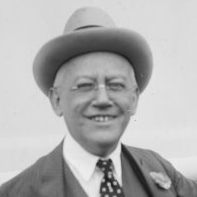
SA

Monsters and mayhem: the life story of Jewish filmmaker Carle Laemmle
JORDAN MOSHE
Freedman explores the fascinating life of German-Jewish immigrant Laemmle in his newly-released documentary simply titled Carl Laemmle.
“I came across an article about Carl Laemmle fighting with Thomas Edison in something called the Trust War,” he explains. “I’m a movie buff, and had never heard this story. I asked friends if they’d heard of Carl Laemmle, but nobody had.”
After searching online, Freedman discovered the incredible story behind this man, and felt that it simply had to be shared. “Nobody really knows his story, not even the people at Universal,” he says.
An admitted research nut, he sought out archival interviews, names in phone books, film historians, and other sources to tell Laemmle’s story. Although the movie mogul is remembered by some for being the pioneer of monster films, Freedman explored every facet of the man and his legacy, from his German origins to his family life.
The sheer range of sources featured in the documentary speak to the depth of Freedman’s search, from interviews with Laemmle’s grandniece, Rosemary Hilb, and great-grandniece, Antonia Carlotta, to footage provided by the Shoah Foundation. Even certain of the Holocaust refugees rescued by Laemmle make appearances. Says Freedman, “I had to find what would tell the man’s story.”
Born Karl Lammle in the southern German city of Laupheim in 1867 to Julius and Rebecca, Carl was the tenth of 13 children, eight of whom died as children of scarlet fever. He was determined from a young age to succeed, in spite of being the smallest student in his class. Ever the imaginative dreamer, he devoured children’s magazines about the Wild West and Buffalo Bill set in the promised land of America. His elder brother, Joseph, had moved there, and extolled it as a land of opportunity. When his mother died shortly before his 17th birthday, his father gave him a boat ticket, and in 1884, he emigrated to the United States.
Arriving in New York, he discovered a land of possibility. He records in his journal, “When I landed in New York in 1884, Edison had just invented the lightbulb. Back then, there was no such thing as a moving picture, an electric refrigerator, automobiles, or radio. The Wright brothers still dreamt of flying.” After working a stint as an errand boy for a druggist for $4 (R57) a week, he discovered that his brother was in Chicago, and went to join him where he worked at a clothing company and then as a bookkeeper.
Time passed quickly, and almost 30 years old, Laemmle found himself living in cheap boarding houses and selling newspapers on Sundays to make ends meet. This was a far cry from the glistening dreams which had drawn him to America. An avid admirer of the still-fledgling film industry and peepshows, he decided to establish the White Front Theatre, his first cinematic venture, working as cashier, projectionist, ticket collector, and janitor. As many as 1 400 people arrived on the day he opened his doors, followed by 4 000 the next day. Two months later, he opened his second theatre, and set himself firmly on the path of film production.
“My friends told me that I was crazy,” he writes, “that I would fail, that people would soon be fed up with movies, and not want to see them anymore. But I believed in movies.”
Blazing an incredible path, he took the industry by storm, going head to head with Thomas Edison who had a monopoly on producing motion pictures. Though he sued Laemmle more than 289 times, Laemmle won every case, while convincing several of Edison’s best actresses and other independent filmmakers to join him in what is today Universal Pictures, with Laemmle as president. Together, they moved out West, and established what would become known as Hollywood.
In spite of battling to remain afloat as a German immigrant in America during World War I, Laemmle maintained a connection with his German home, visiting Laupheim until he was no longer allowed to do so in the 1930s. Disdained by Hitler and Goebbels as a Jewish filmmaker, his film adaptation of All Quiet on the Western Front was disparaged and pulled from German cinemas after the brown shirts filled the theatres to beat up movie goers, deploy stink bombs, and release mice to disturb the screenings.
Certain since 1932 that Hitler’s rise to power was a signal of onslaught against Jews, Laemmle helped to get Jews out of Germany by giving them jobs at Universal, putting his distant relatives on the payroll. At one point, he hired 70 of his own relatives. As Freedman explains, it was said to be the only studio where the executives called the janitors “Sir” because they feared they were addressing the boss’s cousin’s brother-in-law.
His spirit did extend beyond his family, however. In spite of being forced to sell Universal after using it as collateral for a loan, a move which ended his film career, he devoted time and money to the mission of getting Jews out of Germany. As America’s immigration policy was unyielding at the time, this was no easy task. Laemmle, however, was determined, penning multiple affidavits for hundreds of Jews, guaranteeing that they had a place to live, employment, and economic support. Even when the government eventually banned his affidavits, he got friends and family to write them for him.
Although his struggle took a toll on his health, bringing on a heart attack at the age 72 in 1939, Laemmle succeeded in rescuing more than 300 Jewish families from the Nazis. More than 2 000 people attended his funeral. The legacy he left behind was multifaceted, says Freedman, and remains relevant today. “Laemmle was such a mensch,” he says. “With so much divisiveness over the subject of immigration today, we need to remember the immigrant who helped make America great.”




